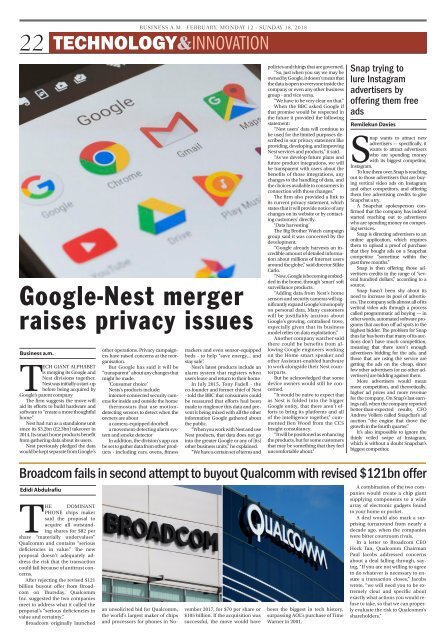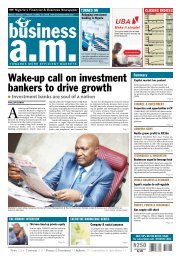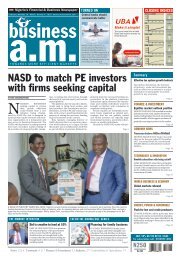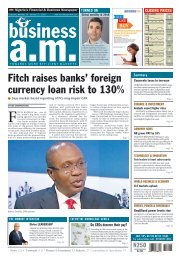12-02-2018
Create successful ePaper yourself
Turn your PDF publications into a flip-book with our unique Google optimized e-Paper software.
22<br />
BUSINESS A.M. FEBRUARY, MONDAY <strong>12</strong> - SUNDAY 18, <strong>2018</strong><br />
TECHNOLOGY&INNOVATION<br />
Google-Nest merger<br />
raises privacy issues<br />
Business a.m.<br />
TECH GIANT ALPHABET<br />
is merging its Google and<br />
Nest divisions together.<br />
Nest was initially a start-up<br />
before being acquired by<br />
Google’s parent company<br />
The firm suggests the move will<br />
aid its efforts to build hardware and<br />
software to “create a more thoughtful<br />
home”.<br />
Nest had run as a standalone unit<br />
since its $3.2bn (£2.3bn) takeover in<br />
2014. Its smart home products benefit<br />
from gathering data about its users.<br />
Nest previously pledged the data<br />
would be kept separate from Google’s<br />
other operations. Privacy campaigners<br />
have raised concerns at the reorganisation.<br />
But Google has said it will be<br />
“transparent” about any changes that<br />
might be made.<br />
‘Consumer choice’<br />
Nests’s products include:<br />
internet-connected security cameras<br />
for inside and outside the home<br />
thermostats that use motiondetecting<br />
sensors to detect when the<br />
owners are about<br />
a camera-equipped doorbell<br />
a movement-detecting alarm system<br />
and smoke detector<br />
In addition, the division’s app can<br />
be set to gather data from other products<br />
- including cars, ovens, fitness<br />
trackers and even sensor-equipped<br />
beds - to help “save energy... and<br />
stay safe”.<br />
Nest’s latest products include an<br />
alarm system that registers when<br />
users leave and return to their home<br />
In July 2015, Tony Fadell - the<br />
co-founder and former chief of Nest<br />
- told the BBC that consumers could<br />
be reassured that efforts had been<br />
made to ringfence this data and prevent<br />
it being mixed with all the other<br />
information Google gathered about<br />
the public.<br />
“When you work with Nest and use<br />
Nest products, that data does not go<br />
into the greater Google or any of [its]<br />
other business units,” he explained.<br />
“We have a certain set of terms and<br />
policies and things that are governed.<br />
“So, just when you say we may be<br />
owned by Google, it doesn’t mean that<br />
the data is open to everyone inside the<br />
company or even any other business<br />
group - and vice versa.<br />
“We have to be very clear on that.”<br />
When the BBC asked Google if<br />
that promise would be respected in<br />
the future it provided the following<br />
statement:<br />
“Nest users’ data will continue to<br />
be used for the limited purposes described<br />
in our privacy statement like<br />
providing, developing, and improving<br />
Nest services and products,” it said.<br />
“As we develop future plans and<br />
future product integrations, we will<br />
be transparent with users about the<br />
benefits of those integrations, any<br />
changes to the handling of data, and<br />
the choices available to consumers in<br />
connection with those changes.”<br />
The firm also provided a link to<br />
its current privacy statement, which<br />
states that it will provide notice of any<br />
changes on its website or by contacting<br />
customers’ directly.<br />
‘Data harvesting’<br />
The Big Brother Watch campaign<br />
group said it was concerned by the<br />
development.<br />
“Google already harvests an incredible<br />
amount of detailed information<br />
about millions of Internet users<br />
around the globe,” said director Silkie<br />
Carlo.<br />
“Now, Google is becoming embedded<br />
in the home, through ‘smart’ soft<br />
surveillance products.<br />
“Adding data from Nest’s home<br />
sensors and security cameras will significantly<br />
expand Google’s monopoly<br />
on personal data. Many customers<br />
will be justifiably anxious about<br />
Google’s growing, centralised trove,<br />
especially given that its business<br />
model relies on data exploitation.”<br />
Another company watcher said<br />
there could be benefits from allowing<br />
Google engineers working<br />
on the Home smart speaker and<br />
other Assistant-enabled hardware<br />
to work alongside their Nest counterparts.<br />
But he acknowledged that some<br />
device owners would still be concerned.<br />
“It would be naive to expect that<br />
as Nest is folded into the bigger<br />
Google entity, that there aren’t efforts<br />
to bring its platforms and all<br />
of the intelligence together,” commented<br />
Ben Wood from the CCS<br />
Insight consultancy.<br />
“It will be positioned as enhancing<br />
the products, but for some customers<br />
that may be something that they feel<br />
uncomfortable about.”<br />
Snap trying to<br />
lure Instagram<br />
advertisers by<br />
offering them free<br />
ads<br />
Remilekun Davies<br />
Snap wants to attract new<br />
advertisers — specifically, it<br />
wants to attract advertisers<br />
who are spending money<br />
with its biggest competitor,<br />
Instagram.<br />
To lure them over, Snap is reaching<br />
out to those advertisers that are buying<br />
vertical video ads on Instagram<br />
and other competitors, and offering<br />
them free advertising credits to give<br />
Snapchat a try.<br />
A Snapchat spokesperson confirmed<br />
that the company has indeed<br />
started reaching out to advertisers<br />
who are spending money on competing<br />
services.<br />
Snap is directing advertisers to an<br />
online application, which requires<br />
them to upload a proof of purchase<br />
that they bought ads on a Snapchat<br />
competitor “sometime within the<br />
past three months.”<br />
Snap is then offering those advertisers<br />
credits in the range of “several<br />
hundred dollars,” according to a<br />
source.<br />
Snap hasn’t been shy about its<br />
need to increase its pool of advertisers.<br />
The company sells almost all of its<br />
vertical video ads through a process<br />
called programmatic ad buying — in<br />
other words, automated software programs<br />
that auction off ad spots to the<br />
highest bidder. The problem for Snap<br />
thus far has been that many of its auctions<br />
don’t have much competition,<br />
meaning that there aren’t enough<br />
advertisers bidding for the ads, and<br />
those that are using the service are<br />
getting the ads on the cheap, since<br />
few other advertisers (or no other advertisers)<br />
are bidding against them.<br />
More advertisers would mean<br />
more competition, and theoretically,<br />
higher ad prices and more revenue<br />
for the company. On Snap’s last earnings<br />
call, when the company reported<br />
better-than-expected results, CFO<br />
Andrew Vollero called Snapchat’s ad<br />
auction “the engine that drove the<br />
growth in the fourth quarter.”<br />
It’s also impossible to ignore the<br />
thinly veiled swipe at Instagram,<br />
which is without a doubt Snapchat’s<br />
biggest competitor.<br />
Broadcom fails in second attempt to buyout Qualcomm with revised $<strong>12</strong>1bn offer<br />
Edidi Abdulrafiu<br />
THE DOMINANT<br />
PHONE chips maker<br />
said the proposal to<br />
acquire all outstanding<br />
shares for $82 per<br />
share “materially undervalues”<br />
Qualcomm and contains “serious<br />
deficiencies in value.” The new<br />
proposal doesn’t adequately address<br />
the risk that the transaction<br />
could fail because of antitrust concerns.<br />
After rejecting the revised $<strong>12</strong>1<br />
billion buyout offer from Broadcom<br />
on Thursday, Qualcomm<br />
Inc. suggested the two companies<br />
meet to address what it called the<br />
proposal’s “serious deficiencies in<br />
value and certainty.”<br />
Broadcom originally launched<br />
an unsolicited bid for Qualcomm,<br />
the world’s largest maker of chips<br />
and processors for phones in November<br />
2017, for $70 per share or<br />
$105 billion. If the acquisition was<br />
successful, the move would have<br />
been the biggest in tech history,<br />
surpassing AOL’s purchase of Time<br />
Warner in 2001.<br />
A combination of the two companies<br />
would create a chip giant<br />
supplying components to a wide<br />
array of electronic gadgets found<br />
in your home or pocket.<br />
A deal would also mark a surprising<br />
turnaround from nearly a<br />
decade ago, when the companies<br />
were bitter courtroom rivals.<br />
In a letter to Broadcom CEO<br />
Hock Tan, Qualcomm Chairman<br />
Paul Jacobs addressed concerns<br />
about a deal falling through, saying,<br />
“If you are not willing to agree<br />
to do whatever is necessary to ensure<br />
a transaction closes,” Jacobs<br />
wrote, “we will need you to be extremely<br />
clear and specific about<br />
exactly what actions you would refuse<br />
to take, so that we can properly<br />
evaluate the risk to Qualcomm’s<br />
shareholders.”










